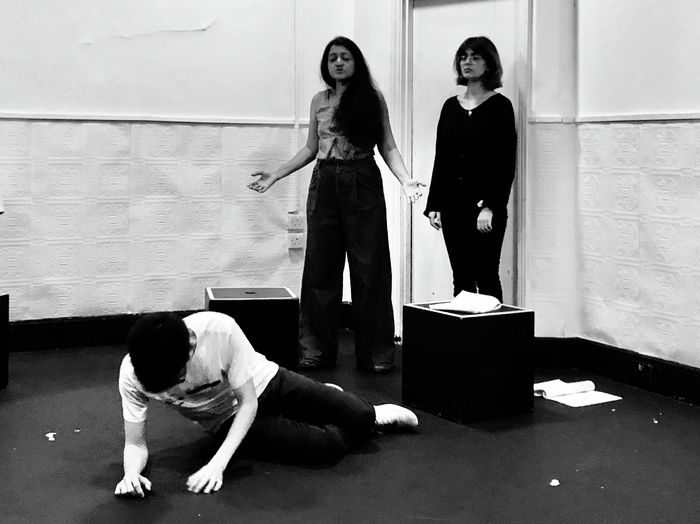The Waves is dreamy, but drags
Bethan Holloway-Strong finds poignancy in this adaptation of a Woolf classic that gently ripples

Adapted for the stage by Sarah Taylor from Virginia Woolf’s novel of the same name, The Waves follows the paths of six childhood friends from their school days through the treacherous waters of growing up. The play is a poignant portrait of life and loss, steeped in the peace of the countryside and the chaos of the city. Beautifully designed and wonderfully acted, this production lets itself down with its dragging energy and lack of impulse.
Much like the waves of its title, the energy of the play ebbs and flows, never holding the audience for quite long enough.
The performances are impressive, especially considering the length of the text and the frequent monologues. Rhoda (Amelia Hills) particularly dazzles in this regard; their monologues carve out their own space in the performance and create beautifully moving moments. The actors also do well in conveying the time leaps in the text through their changing physicality and vocal performances. In the period of childhood, this physicality sometimes strays into ridiculousness, but it ultimately works well when contrasted with the later portrayals of middle age. Jinny (Orli Vogt-Vincent) is a salient example: her character develops from a giddy schoolgirl into a jaded woman. In terms of vocal performances, Tom Foreman’s Louis must be talked about. His performance of Louis’ older years is impeccable, but his attempts at an Australian accent, although valiant, cannot help but create a sense of the ridiculous. (Perhaps he was simply unlucky to be reviewed by an Australian).
Starting as simple children, the actors bring great nuance to their older characters. Bernard (Jonathan Iceton), pretentious in his university years, gradually begins to realise the hollow emptiness of his life, and Iceton plays this brilliantly. The complex character of Susan (Alice Murray), simultaneously fulfilled and unsatisfied, is brought to shining life. The character development in this play is amazing, and credit must go to the actors.

Despite the strengths of the actors, they are unable to keep up the energy in the performance. Neville (Ben Philipps) delivers a soaring monologue rich with emotion, but this moment stands out from the rest of his other lower-energy performances. This is not necessarily the fault of the actors – the script is simply too long. It is certainly a daunting task to adapt an entire novel to the stage, but Taylor perhaps needed to be more ruthless in her cuts. Some scenes dragged on entirely too long, while others were too short, creating a disjointed feeling in an otherwise smoothly flowing production. This was an ambitious undertaking on Taylor’s part, and her vision must be applauded, but the production lacked the energy to keep it afloat.
The production elements of this show, on the other hand, were simply outstanding. Bar a few opening-night difficulties, the lighting design (Mahon Hughes) was absolutely beautiful and went a long way to creating the dreamy mood of the piece. The sound design (William Audis) fit perfectly with the action on stage. The set (Annabelle York) was impressive, with so many different locations represented flawlessly. All of the production design played into the cohesion of the production overall, which is perfectly captured in the costumes (Caroline Katzive). Representing the changes in the characters and the changes in time, the costumes are the perfect finishing touch to the production elements.
The use of multimedia works well, especially with projections onto the gauze allowing the audience to see the movement of people behind it. The videography (Olivia Railton) perhaps plays the largest role in creating the mood of the piece, but some clips are too obviously modern in their technique and style to fit cohesively with the rest of the clips. This creative and innovative concept slightly falls down in its execution, but it still performs its purpose.

Overall, this is an ambitious production that perhaps aims too high. Although individual elements are outstanding, the script is simply too long to support itself energetically. Much like the waves of its title, the energy of the play ebbs and flows, never holding the audience for quite long enough.
 News / Caius mourns its tree-mendous loss23 December 2025
News / Caius mourns its tree-mendous loss23 December 2025 News / Clare Hall spent over £500k opposing busway 24 December 2025
News / Clare Hall spent over £500k opposing busway 24 December 2025 Comment / The ‘class’ of Cambridge24 December 2025
Comment / The ‘class’ of Cambridge24 December 2025 Interviews / Politics, your own way: Tilly Middlehurst on speaking out21 December 2025
Interviews / Politics, your own way: Tilly Middlehurst on speaking out21 December 2025 Comment / Yes, I’m brown – but I have more important things to say22 December 2025
Comment / Yes, I’m brown – but I have more important things to say22 December 2025








